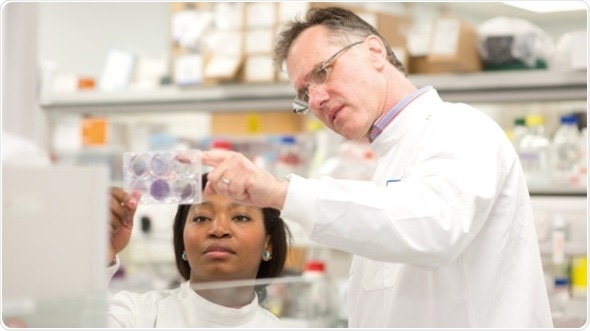UK and European research collaborations in cancer research have received a vote of confidence by three major cancer charities, with an announcement today of approximately £30 million into six international projects.

Cancer Research UK is partnering with two of Europe's leading cancer research charities, AIRC (Associazione Italiana per la Ricerca sul Cancro) and FC AECC (Asociación Española Contra el Cáncer), to invest in six international collaborations, which are aimed at accelerating progress in translational research.
Scientists in the 5-year funded Accelerator Awards projects will investigate the potential of immunotherapies in treating liver cancer; develop manufacturing methods for CAR-T cell production; track cancer cell evolution; investigate drug resistance in blood cancers; devise a blood test for advanced prostate cancer and find new routes for personalizing blood cancer treatment.
As the UK and EU work to form a new relationship after Brexit, the awards are an example of how funding organizations are seeking to continue to collaborate post-Brexit to drive research forward.
Dr Iain Foulkes, executive director of research and innovation at Cancer Research UK, said:
No single organization or country is going to beat cancer on its own. Research must be prioritized as the UK builds a new relationship with the EU, as much-needed breakthroughs in treatment are dependent on collective action from the international research community.
Our Accelerator Award funding will lay the groundwork for a Europe and UK research pipeline, boosting our life sciences industry, and ensuring basic biological research translates into new innovative treatments in future."
Each collaboration is aiming to deepen our understanding of cancer and bring us closer to new treatments, making use of the expertise and diverse technologies of the different partner organizations. UK scientists are leading two of the funded programmes, Italian scientists are leading three, and one by a Spanish researcher.
The scope of these awards brings together world-class researchers who would not have previously been able to work together without this funding available. A number of the grants are also focused on training the next generation of early career scientists and clinicians so that the expertise is developed to carry this research forward.
Federico Caligaris Cappio, AIRC scientific director, said:
Cancer research must innovate relentlessly to understand and deal with the complexity of cancer. This requires more investment, coordinated interdisciplinary research and international collaborations, because cancer doesn't know borders, and research has to overcome them. The partnership with Cancer Research UK and FC AECC has allowed us to fund collaborative projects that promote the development of international networks and the creation of new research tools that could not be done independently at the national level."
Isabel Orbe, general director of the FC AECC, said:
A global collaboration is needed to accelerate results in cancer research. This charity partnership will provide tools to support researchers in an international framework, helping them to create multidisciplinary networks and support the research of new unexplored areas. Moreover, this call looks to improve cancer research in a global manner and with a clear focus on the patients, with the final aim of defeating cancer."
Accelerator Award projects include:
- HUNTER: Hepatocellular Carcinoma Expediter Network - Newcastle University will be leading a project of around £5 million to establish a European and UK network of clinicians and scientists specializing in hepatocellular carcinoma (HCC) - the most common primary liver cancer in adults. The aim will be to understand the immune environment in liver cancer and whether immunotherapies might be effective at treating this disease.
- Innovative CAR Therapy Platform (INCAR) - The University of Milan-Bicocca will be leading a project of around £4.5 million to support research into CAR T-cell therapy, which is where immune cells are 'edited' so that they are more able to target and destroy tumor cells. The team aim to make these therapies more accessible and affordable through developing manufacturing methods and providing recommendations for CAR T-cell immunotherapy development, which could be applied to a broad range of cancer types.
- Single cell cancer evolution in the clinic - Researchers at Fondazione Centro San Raffaele, Functional Genomics of Cancer Unit, will lead on project with around £4.8 million funding to track cancer cell evolution in organoids, clusters of cells that behave similarly to cells in human organs. Their findings will be used to learn more about drug resistance, and to predict optimal treatment options for relapsed cancer patients.
- Early detection and intervention: Understanding the mechanisms of transformation and hidden resistance of incurable hematological malignancies - The Clinica Universidad de Navarra is leading on a project of around £4.8 million to investigate blood cancers. The team will seek to uncover the mechanisms of initial tumor resistance to drugs and identify new treatment opportunities for the disease.
- Multi-modal clinical testing of prostate cancer patients plasma - The University of Trento, Centre for Integrative Biology (CIBIO), are leading on a project worth around £5 million to develop a blood test for advanced prostate cancer treatment selection. The team's work will look to develop a test ready for clinical studies that will stratify patients into personalized treatment arms.
- ACRCelerate: Colorectal Cancer Stratified Medicine Network - The Cancer Research UK Beatson Institute in Glasgow will lead on a project with up to £5 million funding to find new routes for personalized bowel cancer treatment. The team will be looking to identify new targets so that patients can be stratified into different treatment groups, which may lower the risks for patients in clinical trials. These methods will also help to reduce the level of animal research required.